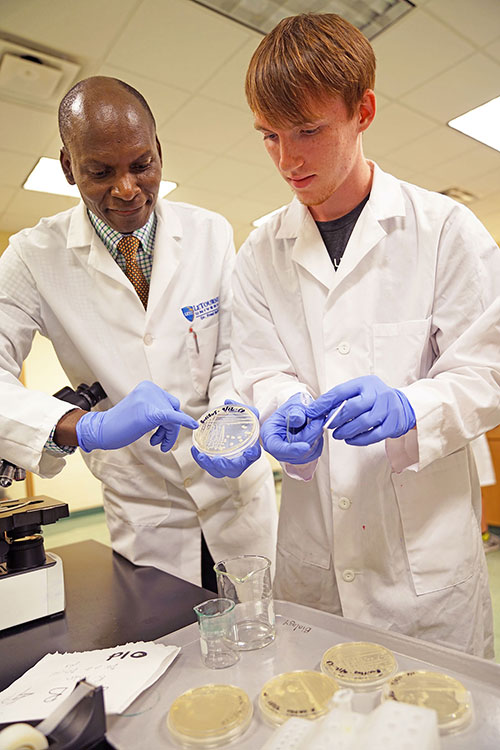
By Jenna Pace
A college biochemistry lecture hall is filled with over 100 students. The professor’s writing biochemical formulae on the board at lightning speed. Students are scribbling to write notes and copy the formulae.
He writes until he reaches the end of the board, then immediately erases where he started writing and repeats, until finally, one student raises her hand.
“Excuse me, sir,” she says.
“Yes?”
“I’m confused. I don’t understand.”
The professor laughs. “I expected that.”
He turns back to the board and continues without further response.
In an instant, the story of Dr. Frederick Baliraine—a biochemistry student struggling to keep up with his indifferent professor—changed course.
“My heart sank,” he said. “He just laughed in response to her, and she was embarrassed. It was at that moment I decided that I was going to study biochemistry and teach it to students to make life easier for them.”
Baliraine was an undergraduate student studying veterinary medicine at that time in his home country of Uganda. He completed his veterinary degree and immediately continued with his newfound goal of professorship by pursing a master’s degree in biochemistry at the University of Kenya.
“I knew there was a better way to teach,” he said.
Particularly interested in microbiology, Baliraine threw himself into research and was awarded a scholarship from Italy’s University of Pavia, where he completed his doctoral work as a World Laboratory Fellow.
“Sometimes I would forget to eat because I was so focused on my work,” he said.
Building upon his love for and experience with high-level biological research, Baliraine brought his talent to the University of California, Irvine and applied his skill toward solving malaria, one of the world’s most threatening diseases.
“Malaria kills someone almost every 20 seconds somewhere in the world. Between 200 and 400 million people are affected by it every year,” he explained. “One of the problems with malaria is that there’s a lot of resistance to the drug. By the time resistance appears in the clinic, it will have started at the molecular level. There are changes in the genome which begin to accumulate to the level where it becomes resistant.
“One mutation doesn't change it so much,” he said, “but then you get another one, and then another. As changes accumulate, the disease becomes resistant. At the molecular level, you’re able to know ahead of time before it manifests in the population, and you can advise policies so they can change the drug.”
By 2012, Baliraine was researching and teaching as an adjunct at the University of San Francisco, but felt the call to be in the classroom full-time.
“When I came to LeTourneau University, I saw the people here and the whole environment, and I just got hooked.”
The addition of Baliraine—which he credits to God’s grace—was enormously welcomed by LETU. His office, in addition to publications he’s authored, is filled with gifts students have given him, clear signs of affinity. He’s received over a dozen awards, recognitions and honors, but the one he displays with the most pride is his “Excellence in Teaching” Award, presented to him by College of Education, Arts & Sciences graduating seniors in May 2017.
“I just enjoy teaching because I see it as a calling,” he said. “That’s not a simple kind of thing. I look at it as a privilege, to be part of somebody’s life. And as a teacher, you may not know how much influence you have.”
He’s performed microbiological research all around the world. Today you can find him in an LETU lab, sharing everything he’s learned with his students, particularly in the Science Education Alliance's PHAGES program. In SEA-PHAGES, undergraduate biology students isolate previously unidentified viruses from the environment, characterize, sequence and annotate their genomes. These viruses potentially have the ability to terminate infectious bacterial diseases such as tuberculosis. Students then have the opportunity to present their research at academic conferences and publish their data in scientific journals.
Having had the rare chance to research as an undergraduate himself, Baliraine is an enthusiastic advocate for giving his own students the same opportunity.
“Our students are going into real research,” he said. “They’re being taught cutting-edge techniques to which very few undergraduates, or even graduates, have access. This is the kind of thing our students are being exposed to. It’s quite exciting.”
Baliraine says graduate schools often look for students who already know their way around a laboratory, think critically, troubleshoot and have the patience that scientists frequently need when they’re searching for answers.
“This is what we’re training our students for,” he says.
He says not all students find it pleasant to be challenged with such high standards while they’re in school, but they appreciate it once they join the work force.
“It’s encouraging to see students, when they proceed on to graduate school or elsewhere, write back and say ‘You know, I really appreciate the way you challenged us because you actually prepared us for what we are facing right now.’”
During his five years at LETU, he’s sent a number of students off to graduate school, into labs, hospitals, veterinary clinics and beyond. And he’s answered countless questions along the way, just as he set out to do the day he decided to pursue the teaching profession.
“I think it’s the responsibility of the professor to help people–students–to be all that God has called them to be.”